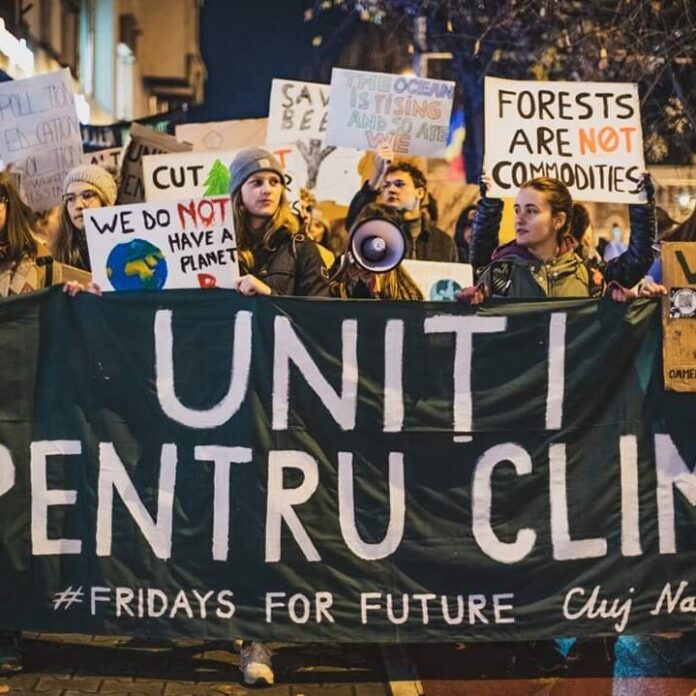A relaunched group of “Fridays for Future” in Romania held its first meeting in Brasov on February 26 and 27. The document we publish today is the manifesto they agreed at that meeting.
The group has its roots in the school students’ demonstrations against the climate crisis that developed in Romania during 2019. These demos were part of the international movement sparked by Greta Tunberg that took the name “Fridays for Future”. At the peak of the FFF movement in Romania (March 2019) more than 2,000 people, mainly school and university students, took to the streets of Bucharest demanding immediate measures against the unfolding climate crisis. In other parts of the country small protests were also held. The pandemic and the lockdowns did put a brake to this movement on 2020. But the “first seed” was planted.
Read more on the Romania FFF group on an interview with them here
The manifesto in Romanian can be found here
Manifesto: An ecological movement we can believe in
1. A mass movement – from people to people. We recognize the state of crisis we are in and affirm the need for immediate action, in the context in which those in power are not interested in resolving it. We want to build a movement that brings us all together, all who share the same condition and want to fight for our future on a habitable planet. We believe that individual or small group action does not have the power to bring us closer to the world we want and deserve. For us, those deprived (at this moment) of political power, only solidarity and collective effort, coupled with understanding the causes of the climate phenomena we face are the most important weapons.
2. To hold the real culprits accountable. We recognize that the mechanisms of the current economic system and the actions of its superstructure have brought us to the point where we are. The institutions through which those in power operate and the ideas they promote are not our allies. We reject attempts to blame individuals or blame “human nature” for the climate crisis. The system and the rich and privileged are responsible for pollution, the destruction of nature, mass extinctions and the gloomy future that is being prepared for us, not us, those who produce and consume in order to survive. It is our duty to illustrate these facts and to make sure that all those affected understand the source of their problems.
3. Direct action for systematic change, not requests and negotiations. For more than two years, young people around the world have been praying for decision-makers to recognize their right to a world in which to live. Instead, they received empty words about a potentially non-existent future. The time for negotiations and pressure on decision-makers is over, and COP26 confirms this. A flawed system cannot be changed from within. In order to secure our existence, we need ample socio-economic changes, and those who brought us here have no interest in making them happen. We no longer wait for them and we no longer pray for them: we organize, act and make change happen.
4. We do not have to bear the impact. The rich, the privileged, who have control over the system are the ones who have to feel the cost of the transition to a sustainable society, not the ordinary people who are exploited by them. We want a truly just transition to sustainable mechanisms for transport, production, power generation. We oppose measures to reduce emissions that do not come with solutions and alternatives and shift the burden of the process on people, through price increases, layoffs, unemployment, restrictions. We believe that workers in polluting industries need to be consulted in order to draw up action plans according to their needs. In contrast, the holders and shareholders of the responsible industries do not deserve consultation. The latter must be incapable of using their power and influence to maintain the state of affairs.
5. Zero compromises with power. Solidarity with those of the same condition as us. We do not want to collaborate with politicians, corporations, banks and parts of the superstructure. We do not expect answers from them, because they are the ones who caused our problem in the first place. We do not believe that salvation comes from those who stand as our representatives and saviors. We recognize the need for alternative, democratic and popular structures to represent the interests of all social categories. We want to collaborate with all of them, where they exist, and push their construction where it is needed. By building a common front, we can bring our experiences together and fight for ourselves.
6. Action based on education. The organization that we need in order to get out of the climate crisis requires an objective understanding of the ecological, social, economic and political phenomena from which it arose. We want to make this kind of knowledge accessible to all, to understand how to act collectively and to make possible our participation in the processes necessary to build the struggle and the resilience we need, in a democratic way.
7. Unity in front of the oppressive system. We do not view climate change as an isolated phenomenon, separate from the rest of the problems we face. The housing crisis, the oppression of women and minorities, declining living standards, global poverty and cruel exploitation in the workplace, the exploitation of resources in the global South for resources are phenomena related to the climate crisis we are in, with common origins. The answer to these crises is the struggle with the system that caused them. We want to build the unity we need to fight this battle, which cannot and must not be fought on separate fronts.












